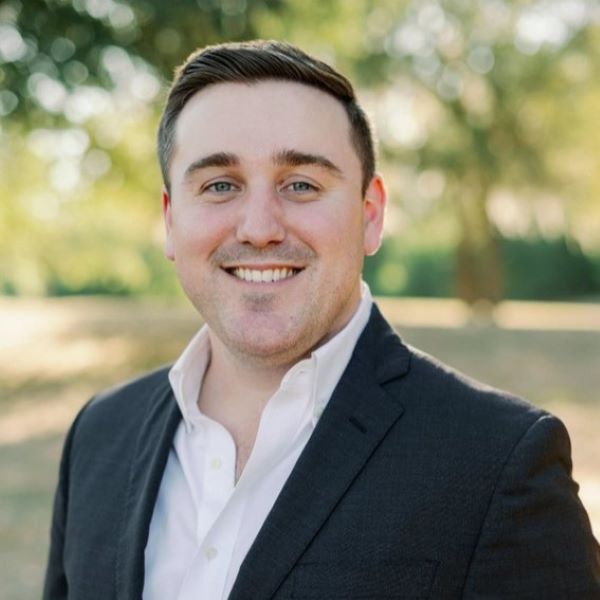Welcome to the national Student Academy of Audiology (SAA) Pathways to Audiology Interview Series! While many audiologists come from a Communication Science Disorders (CSD) background, others have taken different pathways to the field. In this series, the national SAA will interview both audiologists and AuD students who have or are taking non-traditional routes into the profession of audiology.
Our next interview is with Alexander Morris, AuD.

Q: Give us a brief description of yourself, your official title, where you are currently working, etc.
My name is Alex Morris. I currently work as an Account Manager at Oticon, Inc.
In addition to my “day job,” I serve as President of the Texas Academy of Audiology (TAA). When not at work, I enjoy spending time with my wife (who is a pediatric audiologist), our 11-month-old son, and our 9-month-old Shetland Sheepdog puppy.
Q: Where did you receive your bachelor’s and AuD (or PhD)?
BA in Music Performance & Biology – University of Alabama, 2015 AuD – University of Texas at Dallas, 2019.
Q: What made you want to become an audiologist, with focuses on industry?
I did not start college with the goal of becoming an audiologist. In fact, I don’t recall having ever heard the word “audiologist” until the summer before my senior year when I met a private practice audiologist by happenstance. After shadowing at her clinic, I decided audiology—not medical school or public health—was a better fit for my interest in science and my desire to help people. I played five musical instruments growing up and was very active in shooting sports, so it’s not an exaggeration to say my world revolved around hearing—I just didn’t realize there was a healthcare specialty where I could do something meaningful with that.
When I started my AuD program, I had every intention of becoming a private practice audiologist working with adult patients (and specializing in musicians and people with tinnitus). Along the way, clinical rotations in hearing conservation and in industry piqued my interest. The latter was especially interesting to me; however, I had my heart set on private practice.
Q: What does your day entail working for Oticon?
Much like direct patient care, every day is a different adventure! Instead of building relationships with patients, my “patients” are now the various clinics I work with across my territory (Houston & South Texas). I usually spend four days of the week in the field in appointments with clinics and one day in my home office on administrative work.
Instead of helping a patient along their hearing healthcare journey, I now help hearing care professionals help their patients. This “help” comes in many forms: identifying needs; discussions on product and software; professional development in counseling techniques; business development; research updates; developing and implementing marketing strategies; helping with difficult patient fittings and follow-ups; troubleshooting technical and accounting blips; and the list goes on.
Conferences (especially our state association meetings) are very important to attend. I am in regular meetings with colleagues at sister companies such as buying groups and diagnostic equipment manufacturers.
A mentor of mine described this job as “spinning plates”: there are so many different “plates” that require your attention, they’re all important, and you strive to never drop one. Every day I try to put myself in the clinician’s shoes and ask, “what can I do to be most helpful for this clinician today?”
Q: What classes or additional education would you suggest for students wanting to work in industry?
Being an industry rep often entails being a jack of all trades. I have found a solid audiology foundation to be extremely helpful and many of those skills (time management, troubleshooting, counseling, etc.) translate well to this role. In addition to the practical side of hearing aids, it is hugely important to have a decent understanding of business, insurance, marketing, and regulatory issues. Further, it’s helpful to stay up to date on current research and trending professional issues. Attending conferences, taking continuing education courses, and maintaining your professional network are extremely helpful.
Frequently, audiologists will ask me what I am seeing from other clinics, what new research is out, what issues others are experiencing, and what tips/tricks others find helpful. We spend so much time seeing patients that it can be hard to maintain professional growth. Reps are in a unique position to help bring fresh ideas and perspectives.
Q: What opportunities do you remember from your educational career that helped you solidify your interest in industry audiology?
Before I started my one-semester rotation with an industry rep (who was also an audiologist), I thought that reps said the same thing in every appointment…and nothing sounded more dreadful to me. Thankfully, I learned that this could not be further from the truth. I was shocked at how many different skill sets were used during our appointments to either help troubleshoot or to teach about new technologies. I felt like I used every part of my brain, and I was utterly exhausted at the end of each day. It was everything I loved about healthcare and about audiology, just with a wider focus.
Q: What kind of clinical placements would you suggest to a student wanting to go into industry?
As many different settings as possible! Every clinic, school system, and hospital does something a little different. In the same way that an audiology student picks up different verbiage/techniques from different preceptors, you can also pick up on the ways that different clinics operate. This exposes you to a wide variety of systems, potential issues, and creative solutions—all of which can be helpful to reference later.
Q: What do you know now that you wish you knew when you were deciding to go into industry?
You cannot fix every problem. Audiologists are helpers (and “fixers”) by nature. In private practice, I was accustomed to a very high level of patient success: my return rate was less than 2% and my patients were generally very happy.
Working in industry, I have come to realize that I can promise myself to bring my best each day… but I cannot win every battle. Sometimes, the hospital administration will ignore advice/data and make decisions that negatively impact audiology. I cannot change the fact that managed care plans hinder audiology autonomy and sink reimbursement. Sometimes, a patient is just going to claim that their old analog hearing aids sound “just as good” as new technology despite aided speech-in-noise testing and REM to the contrary. I do my very best each day to help my customers help their patients because I believe in this profession—and then I leave work at work. It will all be here tomorrow.
Q: Is there anything else you want to say or suggest to students considering going into industry, or audiology in general?
Whether you’re a staff audiologist, a practice owner, or an industry rep, joining your state audiology organization is one of the most important things you can do as an audiologist. Your audiology license (and ability to practice) are regulated at the state level. If this is not protected and maintained, then your ability to earn a living is in jeopardy.
I am passionate about advocacy and healthcare policy and have spent the past six years on the board of the Texas Academy of Audiology (currently the president). Membership dues help TAA retain the services of a professional lobbyist whose job it is to advance our legislative priorities. Not every audiologist needs to volunteer their time (although more volunteers are certainly needed!). However, if we become a profession of individuals who go to work and go home and never support their state professional organization…then we are completely at the mercy of other groups who take legislative policy seriously: physicians, insurance companies, state agencies, etc.
My involvement with TAA has been incredibly rewarding and I am constantly encouraged by the relationships I’ve made with amazing audiologists in our state. I am thankful to work for a company where audiology is valued and involvement in professional organizations is encouraged.
Related Posts
National SAA Board & Volunteer Opportunities–Your Next Big Step Starts Here
Thinking About Getting Involved? If you’ve ever thought, “I’d love to do more with national SAA, but…” — this is your sign to go for it. Whether you’re swamped with classes or unsure about stepping into leadership, you’re not alone. But here’s the truth: national SAA needs passionate, curious, and committed students like you to…
Lead with Intention: Networking, Wellness, and the Case for Self-Advocacy
Embracing topics such as networking, mental wellness, and self-advocacy are pivotal to setting yourself up for success as a student. While these topics can be scary, there are many resources out there to help you address any concerns you may have. And hopefully, the following tips will help you feel more confident in your own…
Helping Students Build Their Professional Network in Audiology
For many students, the word networking can feel intimidating—evoking images of awkward small talk and high-stakes conversations with seasoned professionals. As advisors, you play a pivotal role in demystifying this process and empowering students to build meaningful connections that can shape their careers. Early networking is essential for students seeking externships, job placements, and volunteer…




